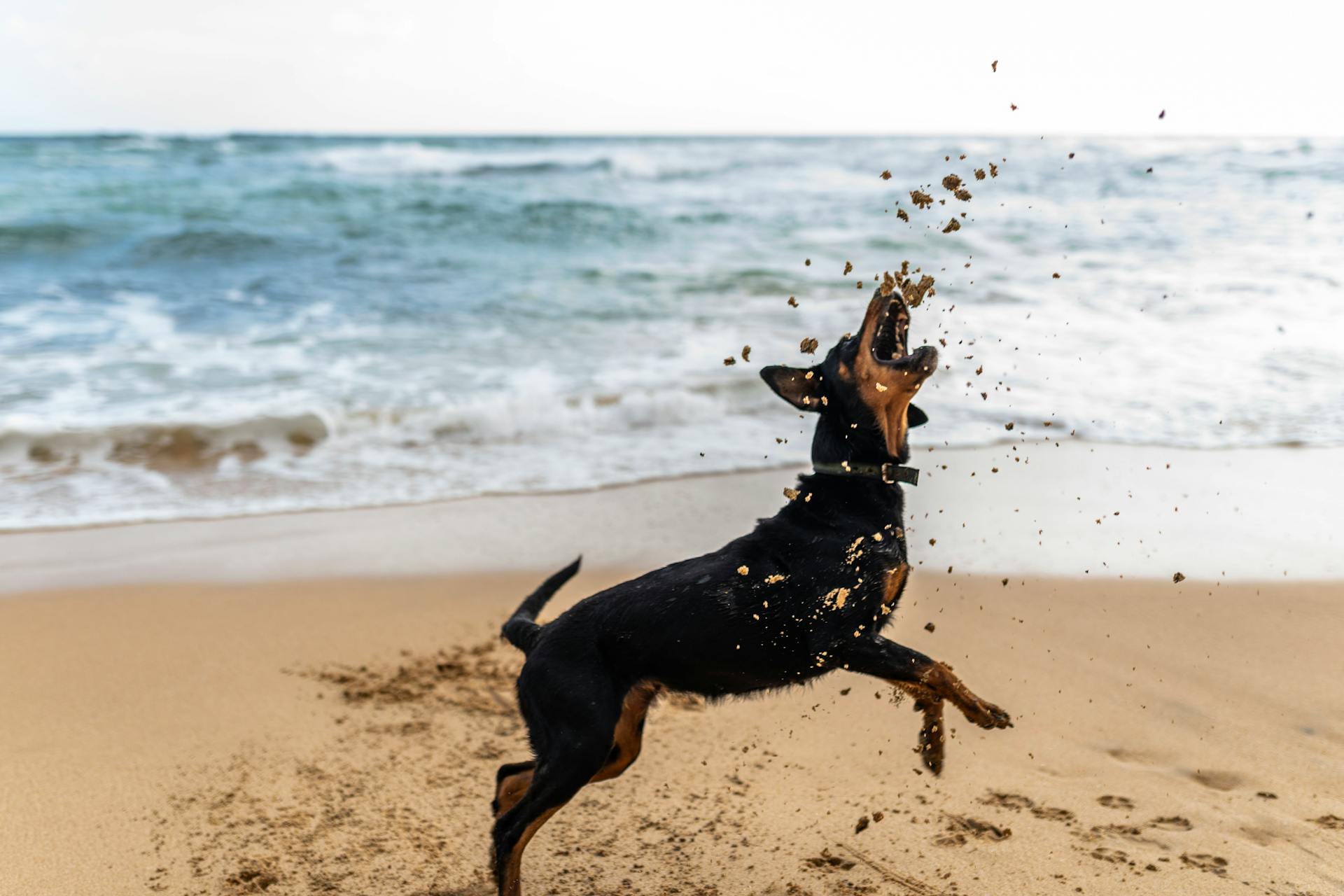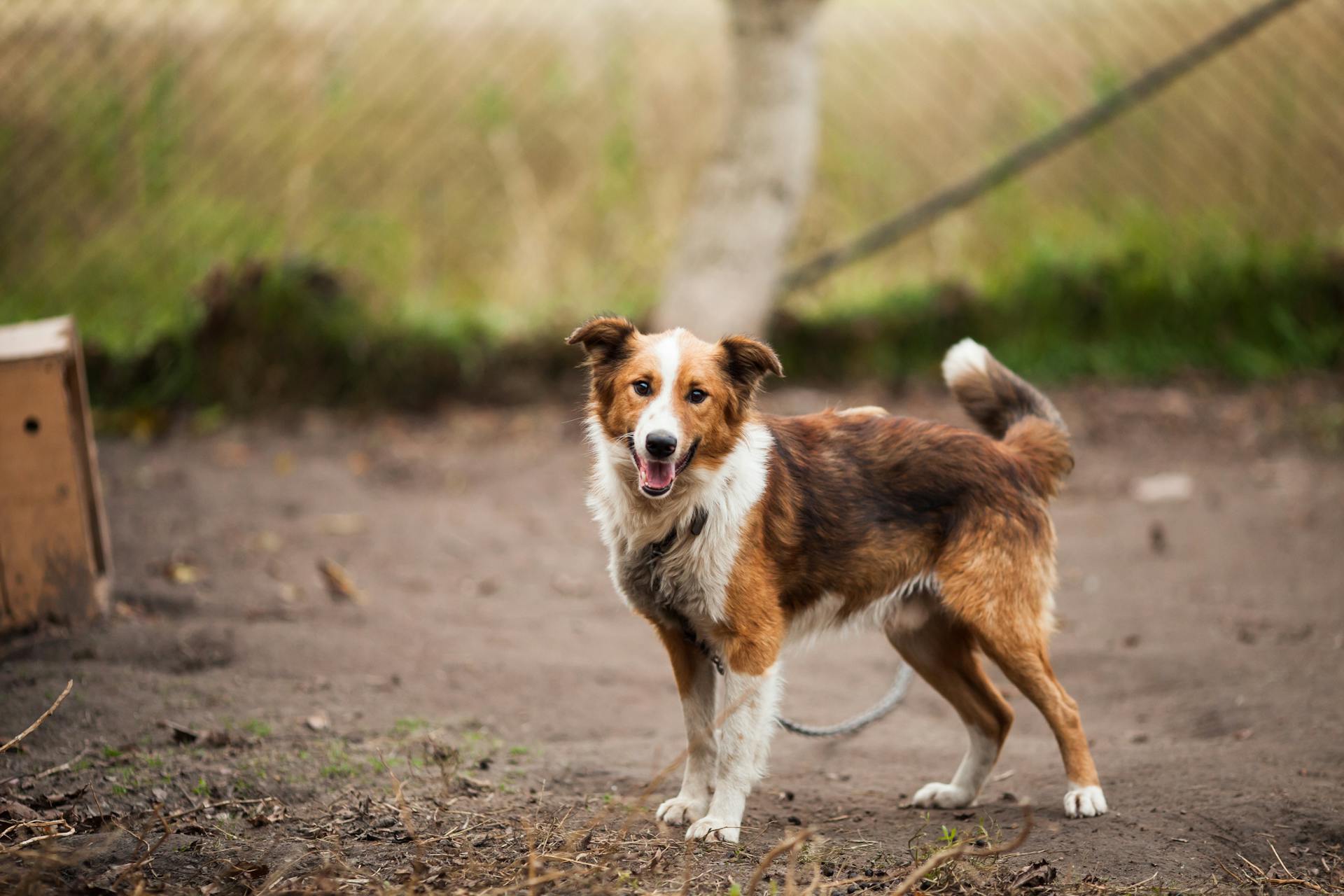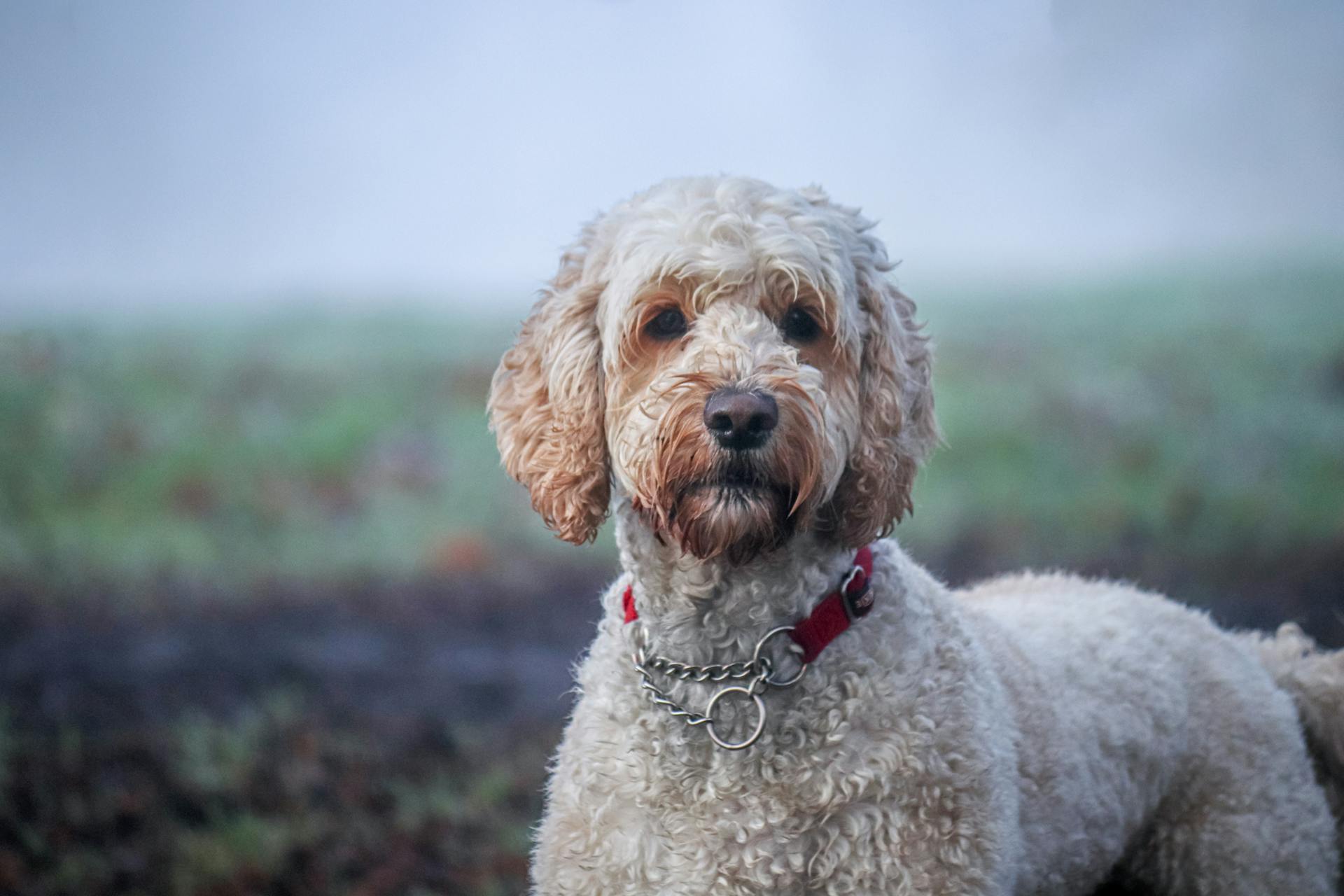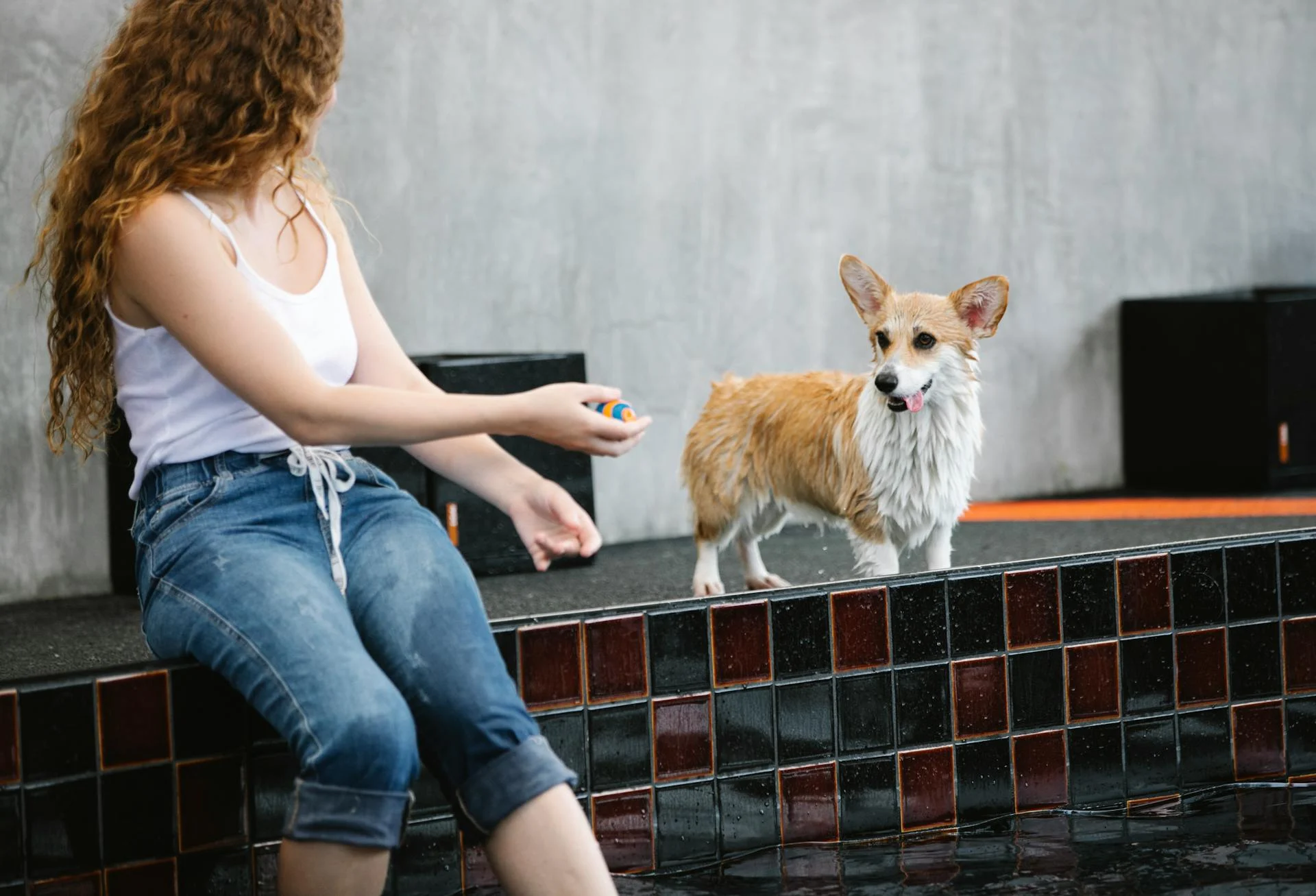
Rottweilers are indeed protective of their families and homes, thanks to their loyal and alert nature. They have a strong instinct to defend their loved ones and territory from potential threats.
Their protective instincts are rooted in their history as working dogs, bred to drive cattle and guard livestock. This natural instinct to protect and serve has been passed down through generations of Rottweilers.
Rottweilers are naturally wary of strangers, which can sometimes be misinterpreted as aggression. However, this wariness is a result of their strong protective instincts and desire to keep their family safe.
Their loyalty to their family is unwavering, and they will often go to great lengths to defend and protect them.
If this caught your attention, see: Are Rottweilers Good Dogs for Families
Ideal Guard Dog Qualities
Rottweilers are naturally protective of their family due to their long history as herding canines, with a strong drive to protect hard-wired in their brains through generations of evolution.
Their intelligence and ease of training make them a great choice for those looking for a loyal companion. They can be trained to prioritize safeguarding the house over treats or other distractions.
Rottweilers are highly intelligent dogs that can be trained to respond to commands and behave in a neutral manner towards animals or people that don't pose a threat. This makes them an excellent choice for families with small children.
Their large size, weighing even more than German Shepherds, can be a deterrent to potential intruders. However, proper training and socialization are crucial to bring out the best in a Rottweiler.
Here are some key qualities that make Rottweilers ideal guard dogs:
- Intelligence: Rottweilers are highly intelligent dogs that can be trained to respond to commands.
- Protective instinct: Their long history as herding canines has given them a strong drive to protect their family.
- Trainability: Rottweilers are relatively easy to train, making them a great choice for those looking for a loyal companion.
- Size: Their large size can be a deterrent to potential intruders.
With the right training and socialization, Rottweilers can be a loving and loyal companion for families. They will go to great lengths to protect their family and home from harm.
Rottweiler as a Family Dog
Rottweilers can make fantastic family dogs if socialized properly. They have a strong instinct to protect their family, which can be a great asset in a household with small children.
Rotties are highly intelligent and relatively easy to train, making them a great choice for first-time dog owners. With patience and consistency, you can teach your Rottweiler to be gentle and calm around kids.
If this caught your attention, see: Great Pyrenees Protective
To ensure a smooth transition, it's essential to socialize your Rottweiler from an early age. This will help them interact well with family members and other pets. Socialization is a great chisel for Rotties to edge out the anger-ridden edges from their persona.
Rottweilers are naturally protective of their family and territory, but with proper training and socialization, they can learn to distinguish between threats and harmless situations. They will go to any extent to protect your home from mishaps and thieves.
Here's a brief overview of the key characteristics that make Rottweilers great family dogs:
- Intelligent and trainable
- Highly protective of family and territory
- Relatively easy to socialize
- Great with children if socialized properly
Protecting Home and Family
Rottweilers are naturally protective of their family and home, but it's essential to remember that appearance and reputation amount to nothing more than deterrent value.
To be effective protectors, Rottweilers require specific qualities that are not automatically included with their breed. These qualities are often found in certain lines of dogs and can be difficult to find.
Breeders who specialize in producing protective dogs, like Guardian Rottweilers, look for dogs that have demonstrated capability in the protection field. They regularly test and work dogs to ensure they are willing to engage a human adversary and come under control once the threat is neutralized.
Rottweilers are highly intelligent and relatively easy to train, making them a great choice for those who want a loyal and protective companion.
A well-socialized Rottweiler is a great asset to any family, but it's crucial to remember that they can be very protective of their children and should be carefully supervised when with a group of kids.
Here are some key factors to consider when looking for a Rottweiler as a guard dog:
- Look for breeders who specialize in producing protective dogs.
- Choose a dog that has demonstrated capability in the protection field.
- Ensure the dog is well-socialized and trained.
- Consider the dog's temperament and personality.
By choosing a Rottweiler from a reputable breeder and investing time and effort into their training and socialization, you can have a loyal and protective companion that will defend your home and family with their life.
Training and Behavior
Training your Rottweiler requires patience and consistency. They are a fast-learning breed, but each Rottie's rate of grasping commands varies.
To train your Rottweiler, start early, ideally from the puppy phase. Basic training activities like sit, stand, or stay can be performed in your backyard, which they will consider their own turf, making the experience comfortable for them.
A well-trained Rottweiler can switch into a merciless dog towards home invaders and a gentle companion for the family with utmost ease. They will act neutral towards animals or people that do not pose a viable threat.
Reinforce good behavior by giving your Rottweiler a treat or comfort when they growl or bark at a stranger. This will make them realize you're happy with their services and help reinforce this behavior in the future.
Male and female Rottweilers possess a tendency to get aggressive when situations seem undesirable to them. They display signs of aggression via reactions that include growling, snarling, and vigorous barking.
Expand your knowledge: Do Rottweilers Growl When Happy
To control impulses, impart rigorous training to your Rottweiler to avoid unwanted scenes. They must be made to act appropriately or contextually according to the person. Once your dog masters the "Stay" command, this situation can be avoided easily.
Here are some key points to keep in mind while training your Rottweiler:
- Be patient and considerate as a loving dog owner.
- Give them a tasty treat for their excellent work.
- Use positive reinforcement for even the slightest of advancements.
- Rigorous training is necessary to control impulses.
- Mastering the "Stay" command is crucial.
Remember, a Rottweiler's behavior is shaped by their instincts and breeding history. They require experienced owners who can provide proper socialization to become a good family companion.
Characteristics
Rottweilers are naturally protective of their families, thanks to their strong instinct to guard and defend. They have a strong prey drive and can be wary of strangers, which can make them excellent watchdogs.
Their intelligence and loyalty make them quick to respond to commands and defend their loved ones if necessary. They have a strong work ethic and are often used as police dogs and search and rescue dogs.
Rottweilers are also naturally suspicious of new environments and people, which can make them appear aloof or standoffish to those who don't know them. This can be intimidating, but it's also a sign of their strong instinct to protect.
Their protective nature is also fueled by their strong sense of loyalty to their family, which can make them fiercely devoted to those they care about. This loyalty can be a great asset in a family pet, but it also means they need consistent training and socialization to ensure they don't become overly aggressive.
Getting a Rottweiler
Getting a Rottweiler can be a wonderful decision, but it's essential to do your research and plan carefully.
Start by checking the American Rottweiler Club for reputable breeders if you want to buy a Rottie puppy. Ask about the line's temperament history and request to meet the puppy's parents if possible.
Another option is to adopt a rescue, where you can research adoptable Rotties by region through the Rottweiler Rescue Foundation.
Before buying or adopting a Rottweiler, make sure to check the laws in your area, as they may be subject to breed-specific legislation due to their history of being bred for aggression and protection.
You'll also want to check local laws when traveling with your Rottweiler, and consider extra liability coverage if you own a Rottie.
If you're interested in similar breeds, consider looking into Boxer, Cane Corso, and Bullmastiff, as they share some similarities with Rottweilers.
Check this out: Where Did Rottweilers Come from
Care Tips
Rottweilers are naturally protective of their families and territories, making them excellent watchdogs. They have a strong instinct to defend and guard, which can sometimes be misinterpreted as aggression.
To keep your Rottweiler's protective nature in check, establish clear boundaries and rules from an early age. This will help them understand what is expected of them.
Rottweilers need regular exercise to burn off excess energy and reduce stress, which can contribute to protective behavior. Aim for at least an hour of physical activity and mental stimulation each day.
Consistency and positive reinforcement training are key to shaping your Rottweiler's behavior and reducing protective tendencies. Reward good behavior and address bad behavior promptly.
Socialization is crucial for Rottweilers, especially during the critical puppy period. Introduce them to various people, environments, and situations to help them become confident and calm in new situations.
By following these care tips, you can help your Rottweiler become a loving and loyal companion, rather than a protective and potentially aggressive dog.
Rottweiler as a Pet
Rottweilers can be good with other pets within their own family if properly socialised.
They can be intolerant of same sex dogs and show aggression towards strange dogs or people.
Rottweilers typically show affection towards children they are raised with.
However, this relationship still requires supervision due to their size and weight, which can cause them to accidentally knock children over when trying to show affection.
Children should always be supervised whenever they are with a Rottweiler.
Rottweiler Information
Rottweilers are known for being protective, but what does that really mean? They have a rich history, originating from Roman cattle drivers and guard dogs in Germany.
Their personality is a key factor in their protective nature, as they are naturally loyal and confident. This makes them excellent companions for families.
On average, Rottweilers can weigh between 85-135 pounds and stand 24-27 inches tall at the shoulder. Their size alone can be intimidating to potential intruders.
However, their health can be a concern, with common issues including hip dysplasia and eye problems. Regular check-ups with a veterinarian are essential to maintain their overall well-being.
To ensure a Rottweiler's health and happiness, providing a balanced diet and plenty of exercise is crucial. This can include daily walks and playtime in a securely fenced area.
Rottweilers come in a distinctive black and tan coat, with a distinctive "black mask" on their face. Their markings can vary, but this classic look is iconic for the breed.
As a breed, Rottweilers are generally good with children, but as with any dog, early socialization is key to ensure they get along. If you're considering introducing a Rottweiler to your family, it's essential to supervise interactions between dogs and young children.
Here's a quick rundown of the ideal living situation for a Rottweiler:
Sources
- https://stayyy.com/are-rottweilers-good-guard-dogs/
- https://rottweiler.me/rottweiler-articles/rottweiler-protect-home-family/
- https://www.petsmont.com/blogs/pets/here-are-the-5-best-guard-dog-breeds
- https://www.greencrossvets.com.au/pet-library/dogs/breed-guides/rottweiler-owners-guide/
- https://www.pawlicy.com/blog/rottweiler-dog-breed/
Featured Images: pexels.com


